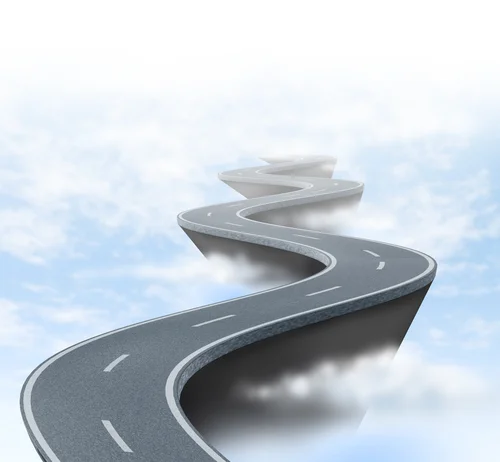How To Take Your Power Back & Reclaim Your Life
/What Does It Feel Like To Lose One’s Power?
Powerless – the feeling that arises when we find ourselves in a bad situation, yet we don’t see any doable solutions for improvement, or we can't find any escape. If we do see answers or escape, they seem impossible, and we lack the courage, energy, and wherewithal to take action.
We may have attempted to change the situation in the past with little to no success, or we may have tried to walk away, but we became discouraged and eventually, in resignation, we said, “this is just how things are."
Deep on the inside, however, we are desperate for and crave change. We daydream of a different life. We tend to look at others, especially on social media, and slip into “compare and despair.” We think, “Man! Look how great they look and how well they are doing! I am such a loser!”
A Fast Track To Burnout Syndrome!
Pushing ourselves through misery as we continue “surviving” each day while yearning for a different life is draining. It is a fast track to burnout.
Because we feel powerless, we trudge on rather than making any meaningful change, and we remain stuck. The possibility of change continues to appear impossible, or the notion of making a change scares the shit out of us to a point where we retreat to what is familiar.
We can’t see the forest for the trees. We fail to understand that familiarity is the emotional equivalent of safety. When misery is familiar, misery feels safe. When feeling good about ourselves and living a vibrant life seem foreign, our nervous system recognizes them as unsafe.
The situation continues to drain our life force, which takes a toll on our physical and emotional wellbeing. We lose our vitality and become angry and resentful. These emotions eventually cascade into bouts of anxiety and depression.
What Script Does Your Nervous System Follow?
The longer we engage with this pattern, the more deeply it becomes embedded in our neurology. This habitual way of living becomes the script for life from which our nervous system reads daily.
The script might sound something like, “My life and health suck. I’ve had so many shitty things happen outside of my control. I’ve been dealt a bad deck of cards, and so, the Universe must be against me. I am powerless to change my situation because I’m too sick, too broke, too dependent on my husband, too scared, the kids, etc. I’ve tried many things already that never worked, so why bother?”
As we continue to rehearse this script, or a similar one, in our minds, we fall deeper into the hole of despair and helplessness. We are in full-blown burnout or damn close to it! And around and around we go until we can’t go any further.
When we reach the point where we can’t go further, we have arrived at a crossroad. It's the point where we have a significant, life-influencing choice to make. We can decide to embrace the fear, challenge, and discomfort involved in making a change, or we can allow the misery of familiarity to overcome us and continue to steal our strength and power.
I Have Walked This Walk!
Can you relate to this scenario? I sure can!
The vignette I've outlined here is based on my personal experiences with crashing into a full-blown breakdown as a result of living with, and trying to heal from, complex, chronic illness while also keeping up with life, dealing with significant marital stress, and an extremely demanding and stressful high-school teaching, counseling, and coaching career.
When I sat down to write this article, I intended telling more of the story around this breakdown, but that is not what will be most helpful to those who are at this crossroad. What will be most beneficial is for me to cut to the chase and provide you with a roadmap for how to take back your power and make necessary shifts in yourself and life so you can feel well again, be the best version of yourself, and the live the life you want to live.
While I am passionate about providing inspiration, hope, and support to others on a similar journey and I would LOVE to tell you all the details of how I took my power back, that is not feasible to do in an article — nor would it serve you well. Your journey is a unique one and figuring out YOUR details as you go is an essential part of the healing and growth process.
I can, however, provide you with the 20 guiding principles that became the framework for physical and emotional healing, healing my marriage, transforming my life, and now building a successful, online functional health consulting and transformational coaching practice where I help others do the same. I am confident that these guidelines will provide anybody that is ready and willing to apply them with a useful framework for health and life transformation as they did me.
Here they are!
#1: Assume 100% responsibility for yourself and your life!
This is the first and most crucial step towards a healthy body, mind, and life. You are 100% responsible for your healing regardless of what happened in the past. Absorb that. Accept it. Allow that mindset to strengthen your commitment to yourself.
#2: Stay Curious! Stay Humble!
Noticing is half the battle. Notice with the same unemotional response you might have in a museum looking at an intriguing exhibit. You may say to yourself "Oh, that's interesting. I want to learn more."
Curiosity is a powerful tool. You can only change what what you are willing and able to notice.
#3: Realize that how to respond to what happens in your life create the outcomes you experience.
Situations happen, and life is often challenging. It sucks for everyone at some point, but it's our response to our situation that affects us more than the situation itself. We always have control over how we choose to respond, even if we did not have control over what happened.
#4: Deep healing and life success are built upon clarity, intention, determination, consistency, and taking action; no matter how small.
We want significant changes because this season in our lives needs to end right now! We want to wake up tomorrow and have everything change and be done with all of this struggle. I understand, but even if that significant, dramatic change happened to you today, you'd still be right where you are. You'd likely fall into the same downward spiral you got caught in before because the small changes are what indeed give us new freedom, the understanding we need, and the clarity that builds a better life.
Don’t underestimate the daily things you do, those things that don't seem big enough to make a difference -- they will. Learn to look for, appreciate, and celebrate the small changes happening daily.
#5: The best and only way through resistance is to go through.
You will encounter resistance, and it's mostly from within yourself. Your need for change and growth is probably the scariest part about getting on the right path. Staying on the same road that made you sick won't lead you to a way out.
This part where we dig deep and start looking at our life, our thoughts, our habits, our patterns, and our fears is an essential part of the healing process.
We go running in the other direction because we're on edge and because our nervous system is stuck in sympathetic response mode -- or fight or flight. Like Cesar Millan, the famous dog whisperer, you need to be a mind whisperer for yourself and say "Stay … stay, or Stop...stop" with calmness, kindness, and assertiveness.
You need to stand still when resistance comes and go through it to the other side. There is no short cut around this challenging part of your healing.
The good news is that this part of healing is seldom, if ever, the awful thing we fear in our minds. You will most likely find yourself enjoying the process and saying to yourself, "What was I so afraid of?"
#6: Your mind can either be your greatest partner or greatest challenge. You decide!
Your mind is the best weapon you have in your artillery against chronic illness. It can also be the biggest weakness in your defense system. Work on your mindset, and you will find your way through.
What have you got to lose by trying?
#7: Thoughts drive feelings. Feelings drive action or inaction. Action or inaction turn into habits and patterns. Habits and patterns create our experiences. Experiences trigger thoughts and feelings. And around and around we go.
This principle is self-explanatory, but it will help if you take the time to embed it in your memory. Try to catch yourself in the act of a pattern or habit, and then notice where it leads you in your thoughts and feelings. Then try to interrupt the trend.
And we're back to #2, being curious. Notice how this step-by-step pattern is working out in your life, and you have the beginning of the solution! Once you notice it, you will want to change it. You might even find yourself feeling some hope.
#8: How we think and behave will either support or block our healing and success in life.
This is a big picture take on #7. Take a step back and look at your life as if you're watching a movie of yourself. If you were watching yourself act out your story, what would you say the outcome of the story will be based on the actions of this hero or heroine? Does that help you see a pattern of thought or a pattern of behavior that needs to be noticed first, then interrupted, then changed?
#9: Remember the Pareto 80/20 Principle: 80% of our results come from 20% of our efforts.
Choose your efforts wisely.
#10: A failure is a failure if you choose it to be.
#11: If you choose to learn and grow from failure then it’s a success.
#12: Each success is built upon a mountain of presumed “failures.”
The things we see as failures often aren't "failures" at all. Create space in your life for learning and growing, and for not being perfect. If you're very sick, you especially need to create this space for yourself.
Is this perception of failure part of your problem?
#13: You get what you tolerate in life.
People tend to treat us and respond to us per what we tolerate from them and how we treat ourselves. This is true for our life situations as well. For example, if we stay in a career, a marriage, or whatever that drains us because we are too fearful of making a change or there are too many seemingly impossible obstacles to overcome, then we will continue to experience what we don't want to experience.
#14: Your vibe indeed does attract your tribe. The energy you put into the universe is the energy you attract into your life.
We are energetic beings. And as energetic beings, we give off vibrations. If you had two tuning forks next to one another, but you only struck one of them the other one would begin to vibrate, too. That's how energy works.
As you go through your day, the energy you put out will resonate back to you. As you work on all these principles on this list, you should begin to see some changes happening in response to your very different energy resonating around you.
#15. Energy flows where your intention goes.
Intentions are like a rudder in life. When you set your intention in a direction, the whole ship begins to move that way. You can set intentions big and small, and you can revisit them, change them, reset them as often as you like.
#16: How others think of us and view us is none of our business nor does it change or dictate our value unless we allow it to.
Chronic illness often comes with a lot of onlookers who have opinions about where we've landed, what we're doing about it, and who we are. This can often be one of the most painful aspects of being chronically ill.
It is common to hear stories of relatives, friends, and colleagues saying you're not that sick, or you imagine it, or you should see a specific doctor, and so on. The truth is, nothing you do or say will likely change what they think anyway.
They don't define you as a person. You get to define yourself.
The sooner you decide to define yourself, the quicker you simplify the whole process of working towards wellness. This is just baggage that needs to shed so you'll be free to get to work.
#17: Seeking approval, validation, or agreement from others does not serve us in any way. It only drains us.
This principle is the other side of the coin of the one above. On the one hand, people say what they're going to say, and you can't control them or stop them from saying it.
Sometimes, though, we go looking for approval to feel better about ourselves. It usually doesn't accomplish anything other than the fact that you just gave someone an invitation to control your feelings about yourself.
You are valuable because you're human. Nobody grants you any more or less value by their opinions.
Cultivate a mindset of value. Think about who you are, who you want to be, how you want to show up in the world. Make a list of the things you want to have in your life. There are many ways to cultivate the value you give yourself. You are in charge of this issue and have full control of it!
#18: Feeling frustrated, discouraged, and burned out are not signals to give up. They are signals to take a break and slow down.
This is sometimes the hardest lesson for many people to learn. Do you have a litany of negative voices that tell you that you're lazy if you lay down in the afternoon? Do you tell yourself you "should" be doing extra today because you didn't get enough done yesterday? Are you afraid that if you lay down, you might not ever get back up?
We are task masters with ourselves, and we often don't even realize we're doing it.
Learn to allow yourself a time of calmly resting and regrouping when you feel beat down! You will get up ready to go again if you can allow yourself this time. Most of us who have fallen into chronic illness have pushed way past all our slow down signals. It's time to listen to what your body is trying to tell you!
#19: Change and healing take place outside of your comfort zone.
By definition, this is true, and change will always feel uncomfortable because it is new and unfamiliar.
A comfort zone is often merely an old habit that is not serving us anymore. It can sometimes be a very unproductive thought pattern or practice in life, but we keep doing it because it's familiar.
This issue can be more difficult than you might think. Our identity is tied to our thought patterns and our daily habits. Changing these patterns can feel like you are losing yourself. If you wait out the uncomfortable feeling, it's replaced by excitement and hope.
To heal, you must identify patterns that have lead to illness and change them. This often requires you to be brave and a willingness to shed all that no longer serves you.
#20: You are the answer to your prayers. No matter what your life circumstances are and what they were caused by, shifting the trajectory of your health and life begins with YOU!
I have described my long journey with chronic illness many times as "falling into the rabbit hole of chronic illness." It does feel like you are falling and losing control — for weeks, months, and sometimes years on end!
These principles work against the strong pull of gravity in your fall. Or, you may feel like you're flattened on the pavement right now, and gravity might feel secure and familiar. It will at least hold you in one place for a while. Settling into the warm pavement, even though you're used to it now, isn't really what you want, nor is it going to get you out of the place you've landed.
These principles are the lift, the helping hand, the emergency services that come and pick you up, but you have to reach out and take them into your heart and mind and decide that you will hold on to them.
I'm living proof that deep healing and life transformation is possible. I suggest you take this list, type it out, and read it daily. Post it somewhere in your house where you can see it, maybe even in multiple locations. Take it with you in your pocket and remind yourself of what you need to do! Devise a plan for how you might implement even one thing in your mindset today.
If you move an inch or even a quarter inch closer today, you'll be surprised at how fast things can shift and you can begin standing upright. And once you're standing upright, you can start walking. Small mindset changes aren't small at all.























































